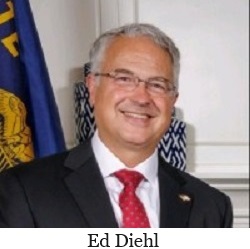Proposed legislation mirrors school choice initiatives
Oregon Representative Ed Diehl(R-Scio) is chief sponsor on a school choice bill that nearly mirrors the School Choice Initiative, scheduled for a hearing on February 14.
HB 4161 is described to reduce the cap on students who can attend a virtual public charter school and requires a school district to allow a student from another district to attend a school in the school district with limitations. The bill also provides for a student to have an education savings account allowing a percentage of funds to follow the student.
Compared to
IP5's Open Enrollment Amendment, and
IP6's School Choice Account, the functions are similar with different terminology. What this bill adds to the initiatives is common sense to the implementation of those initiatives. IP5 refers to “attendance zone” meaning the specific school boundaries the school district has designated as the school of residence based on the resident of the parents. IP5 seems to start with the premise that no student has an assigned school and all students/parents go through the “choice” process. HB 4161 starts with the premise that a student’s place of resident is the assigned school, and parents have a choice option to transfer.
IP5 under 4.a. requires schools to give first priority to students living within their school boundaries (attendance zone)implying everyone goes through the choice process. Second priority goes to students living within the school district, and all others are third. Both IP5 and HB 4161 have the same Equitable Lottery process, free of discrimination, for schools filling available classroom spaces. Both also exclude expelled or suspended students from choice privileges.
HB 4161 increases the number of students that may enroll in virtual public charter school that is not sponsored by the student's resident school district without first receiving approval from the school district, It extends the cap from 3% to 6% in school year 2025-26. IP5 doesn't separate virtual public charter schools from physical public charter schools, only limiting them by capacity of what their instructors can handle.
The bill describes the requirements for a school districts to not participate in open enrollment. They must apply for a waiver and demonstrate open enrollment would cause an adverse impact to the school district based on funding loss for support services and prevent delivering quality education to resident students. Participating school districts must set a standard for the number of students they can accommodate and will admit and may base it by school and grade level. IP5 assume schools have a capacity limit for accommodating transferring students, but is silent on any wavers that could be harmful to the district.
Both IP5 and the bill give first preference to in-district transfers. For out-of-district transfers, the bill requires the school board to give consent unless a waiver is filed or the student resides in a district with a waiver, or it exceeds established standards for capability. IP5 can also decline for exceeding capability. HB 4161 requires consent be given to persons who have siblings currently enrolled in the school regardless if the school district then files for a waiver. IP 5 does not address sibling rights, but both say once transferred, the student remains enrolled at that school until graduation or transfers to another school.
The bill sets out prohibitions for encouraging and discouraging a transfer, which IP5 is silent on. However, IP5 requires school districts to make detailed information on the open enrollment application process easily available.
Both allow students to use existing bus services, but does not require the district to provide transportation across districts or out of district unless required by federal law.
IP 5 has a general statement, “Open Enrollment Student with free and appropriate public education.” This statement lacks definition but it might give constitutional authority to cleanse classrooms of all inappropriate sexual identity curriculum. HB 4161 extends waiver of any applicable tuition fees that are currently waved for low-income under federal requirements and are extended to families with federal adjusted gross income that does not exceed $125,000 adjusted each January 1 for CPI affective January 1, 2026.
A D V E R T I S E M E N T

A D V E R T I S E M E N T
HB 4161 directs the Department of Education to develop and implement a policy that provides for the establishment of education savings accounts for students to use for educational expenses that is equal to 80% of the amount that the student's resident school district would have received. The remaining 20% goes to the student's resident school district to maintain services for resident students - applies to the 2025-2026 school year.
IP6 is a School Choice Account that follows a student receiving education in a private school or in a homeschool setting or with School Choice Services, which can be a combination of educational options or third parties. As with HB 4161, the School Choice Account is funded with 80% of the basic school support funding amount. However, it defines a minimum at $7,600.
HB 4161 does not include an emergency clause, so if the bill passes, it does not stop the voters from making IP5 and IP6 a constitutional amendment, If there are any conflicting parts, they would be overridden by the constitutional amendment and presumably changed in the 2025 session before it is implemented for school year 2025-2026. It is scheduled for a hearing on February 14 at 3pm and currently available for
comment.
--Donna Bleiler| Post Date: 2024-02-09 11:26:42 | Last Update: 2024-02-09 14:47:17 |







